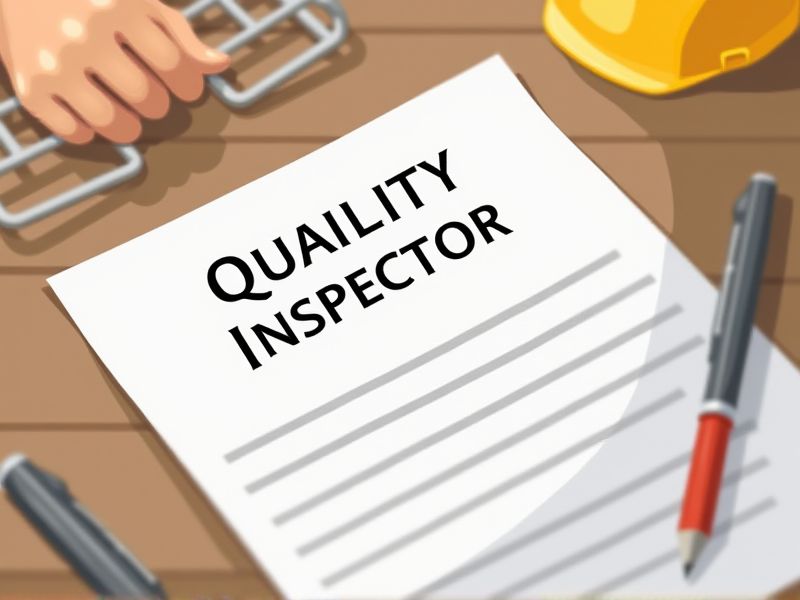
Quality control inspectors in construction ensure that projects meet industry standards and safety regulations. Having certain certifications signifies their proficiency and up-to-date knowledge in specific areas of the construction process. These credentials provide credibility, signaling a professional's ability to identify and mitigate potential risks. Some important certifications you may need include specific safety, quality management, and technical qualification credentials.
OSHA 10-Hour Construction Safety Certification
The OSHA 10-Hour Construction Safety Certification equips a Quality Control Inspector with crucial safety knowledge, reducing workplace accidents. Enhanced understanding of safety protocols allows inspectors to identify and mitigate hazards more effectively. Compliance with safety regulations ensures that projects avoid costly legal repercussions. Certification instills a culture of safety, which elevates overall project quality and confidence among team members.
OSHA 30-Hour Construction Safety Certification
The OSHA 30-Hour Construction Safety Certification provides Quality Control Inspectors with a comprehensive understanding of safety protocols, minimizing potential hazards on construction sites. By ensuring inspectors are well-versed in safety standards, job site accidents and related work stoppages can be reduced, leading to more consistent construction progress. Familiarity with OSHA guidelines equips inspectors to identify and mitigate compliance issues, enhancing the overall quality and safety of projects. The training fosters a culture of safety, promoting proactive measures and efficient communication among construction teams.
ASQ Certified Quality Inspector (CQI)
The ASQ Certified Quality Inspector (CQI) credential helps ensure that construction quality control inspectors are proficient in inspecting and testing procedures crucial for maintaining structural integrity. This certification validates an inspector's ability to accurately document and evaluate compliance with industry standards, which reduces the risk of construction defects. By having CQI-certified inspectors, construction projects experience fewer delays and cost overruns, resulting from early detection of quality issues. An inspector with CQI certification demonstrates a commitment to ongoing professional development, fostering greater trust among stakeholders in the construction industry.
NICET Certification in Construction Materials Testing
Obtaining NICET Certification in Construction Materials Testing leads to standardized knowledge and skillsets, improving a Quality Control Inspector's competence in assessing materials. The certification provides technical credibility, enhancing trust from employers and stakeholders in the construction industry. Through certification, inspectors ensure adherence to national standards, reducing material failures and structural deficiencies. Certified inspectors often identify potential issues early, resulting in cost savings and increased safety in construction projects.
International Code Council (ICC) Certified Construction Inspector
The ICC Certified Construction Inspector ensures adherence to industry standards, leading to higher quality construction outputs. Having a certified inspector reduces the likelihood of structural failures by identifying issues early. The certification process equips inspectors with up-to-date knowledge, aligning projects with current codes and regulations. Employing an ICC-certified inspector often enhances credibility and trust with stakeholders, facilitating smoother project approvals.
ACI Concrete Field Testing Technician Certification
ACI Concrete Field Testing Technician Certification ensures inspectors understand standardized testing procedures, leading to accurate assessment of concrete quality. Proper certification helps identify potential issues early, reducing the risk of structural failures. Certified technicians enhance a project's credibility, as clients and stakeholders trust verified standards are met. Quality control improves when certified individuals apply best practices, ensuring consistent and reliable construction outcomes.
Certified Welding Inspector (CWI)
Certified Welding Inspectors (CWI) are essential in construction quality control because they possess specialized knowledge to ensure welds meet industry standards and safety regulations. Their expertise reduces the risk of structural failures by identifying and addressing defects in welding processes. Increased project efficiency occurs as CWIs promptly detect issues that could otherwise cause costly delays. CWIs enhance overall construction quality, leading to increased safety and longevity of structures and minimizing future repair costs.
NDT Level I Certification
NDT Level I Certification enables a Quality Control Inspector in construction to accurately identify material defects, which enhances project safety. This certification ensures inspectors are trained to perform specific tests that prevent costly structural failures. With NDT skills, inspectors contribute to maintaining regulatory compliance, reducing the risk of penalties. Obtaining NDT Level I Certification assures stakeholders of the inspector's competence in quality assurance processes.
ISO 9001 Quality Management Systems Certification
Companies in the construction industry that adopt ISO 9001 Quality Management Systems Certification often improve their process efficiency, leading to higher quality construction projects. Quality Control Inspectors benefit from ISO 9001 as it provides a standardized framework for assessing and ensuring that construction materials and methods meet specified standards. The certification enhances the credibility of inspectors in the eyes of regulatory bodies and clients, fostering trust in project outcomes. When construction firms consistently apply ISO 9001 standards, it typically results in fewer defects and rework, saving time and resources.
ASTM Standards Training Certification
ASTM Standards Training Certification ensures Quality Control Inspectors in construction are well-versed with industry-standard practices, enhancing their ability to identify and mitigate construction defects. Civil engineering projects often rely on standardized procedures to maintain consistency; thus, certification ensures inspectors can uniformly apply these standards. With evolving safety regulations, this training equips inspectors to stay current with modern construction requirements. Accurate application of ASTM Standards contributes to reducing failure rates in construction projects, which often results in enhanced durability and safety.
Summary
You will likely see improved job performance when earning certifications as a Quality Control Inspector in construction. Certifications validate your expertise, increasing your credibility with employers and colleagues. This can lead to more career advancement opportunities and potentially higher earnings. Certified inspectors often contribute to higher project quality and safety standards.
